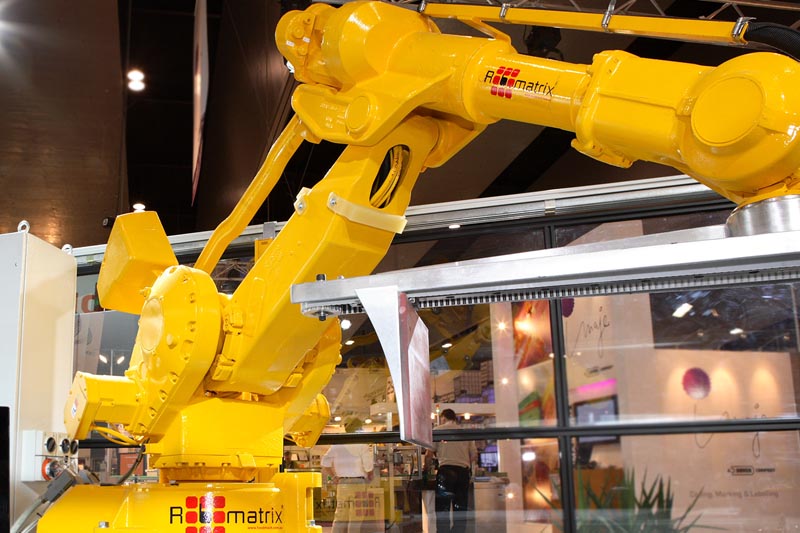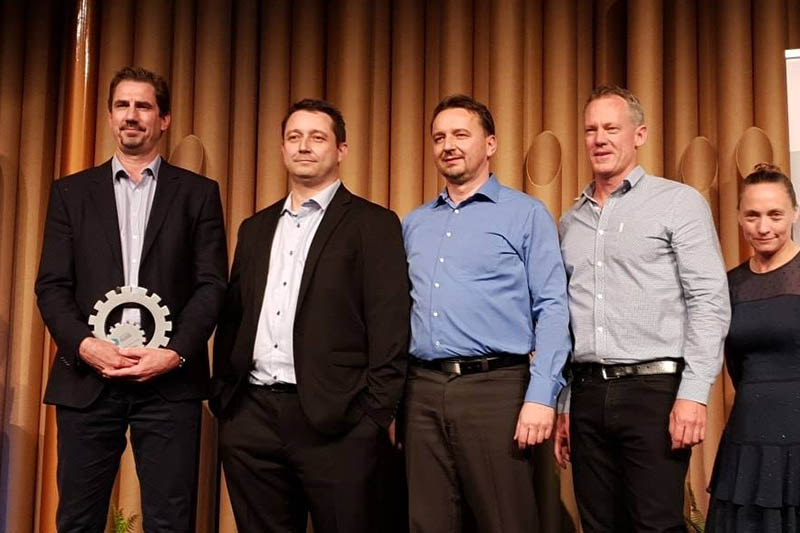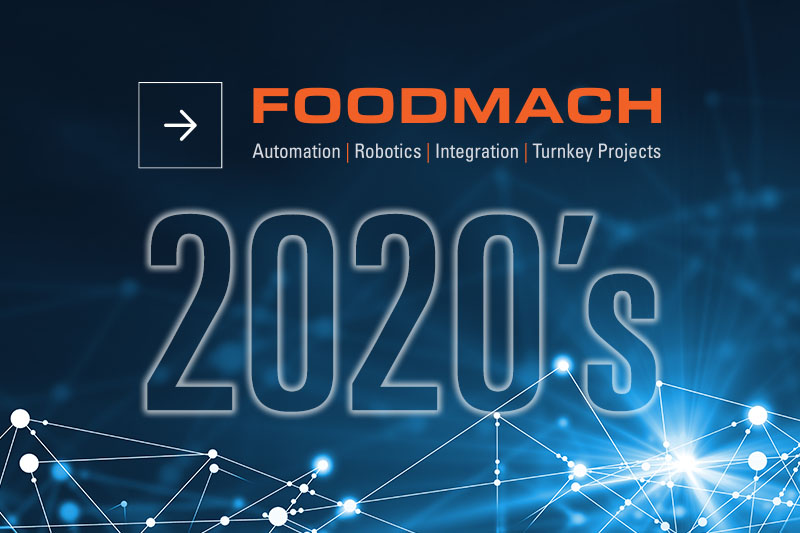50 Big Years
Delivering Australia's best-performing packaging lines
Here's to a memorable five decades!
Our journey through time:

1970's
Leading up to the 1970s, processing equipment supply to the Australian Food and Beverage industries was monopolised by FMC Corporation of USA and Mather and Platt (Kelly and Lewis) of England.

1972
Our history begins when a young mechanical engineer from Melbourne, Ron Bailey, unimpressed by the foreign monopolies, registers Foodmach Industries as a company with the motto 'Built for Australians by Australians'. Gathering a pool of talent, he begins designing and manufacturing custom-made processing equipment.

c. 1973
Foodmach delivers the first automated Cheezel processing line in Australia to what is now known as Snack Foods Australia. Early projects also include automated vegetable and Dim Sim processing lines.

c. 1974
Foodmach becomes a major supplier to fruit canneries, including SPC, Kyabram, Ardmona.

c. 1975
Foodmach becomes a supplier to breweries such as Courage and Carlton & United (CUB). Courage Australia didn't survive its decade-long, head-to-head competition with CUB, a brewing giant and valued Foodmach customer since the 70's.

c. 1979
Foodmach establishes a manufacturing base at Echuca to offer permanent employment to a reliable and expanding group of employees recruited from the closure of the SKF Bearings factory. The main manufacturing base is moved to Echuca, where it remains to this day.

1980's
Foodmach establishes its preferred-supplier status for the beer, soft drink and wine industries.

c. 1981
Manufacturing agreement with Yamashita of Japan and Mitsubishi to manufacture their depalletiser/palletiser designs under license. Foodmach electrical department is established. Hunt Engineering takes over ownership of Foodmach to provide extra working capital and the company name is changed to Foodmach Pty Ltd.

c. 1982
Foodmach supplies skilled staff and management for the construction of the first Yoplait manufacturing facility in Australia. Under strict European licensing regulations, the project was one of several delivered to food manufacturer Plumrose (famous for their ham in a can).

c. 1985
Putting aside the lower-speed Mitsubishi/Yamashita designs, a research and development program is launched to establish Foodmach as a leading manufacturer of high-speed depalletising, palletising and associated conveying systems.

c. 1988
The decade highlight is the design, manufacture and installation of a completely automated 24/7 operation, comprising empty can on pallet receiver, four depalletisers and supply systems to the processing plant, running at maximum efficiency with only one operator. We're pretty happy with that.

1990's
In addition to depalletising, palletising, conveying and integrating any brand equipment, Foodmach starts specialising in software and controls, building on that expertise over the next three decades.

c. 1995
Foodmach builds an export market with basic model glass palletisers, however, our products are more sophisticated than the needs of the Asian and American markets. Copies start appearing and Foodmach rethinks the strategy.

c.1998
The decade's highlight was the design, manufacture and installation of four high-speed fully-automated bulk glass palletisers and associated systems with minimal operators required. We're setting new standards for the industry and laying the groundwork for our future success in depals.

2000's
Foodmach's unique point of difference is its breadth of skill in engineering, software, electrical and installation. By the end of the decade, the customer portfolio includes ACI, Fosters, Lion Beer and Lion Dairy, Kelloggs, Heinz, Orlando Wyndam, SPC Ardmona, Amcor, Simplot, Nestlé, Bonlac and Coca Cola Amatil.

2002
Founder Ron Bailey's retirement triggers a management buyout backed by 25 local shareholders. Hunt Engineering hands over to the new ownership. Ron retains a shareholding while previous Foodmach directors head the new Foodmach management team.

2007
Our R&D pays off. Robomatrix®, our high-speed innovation in robotic palletising is revealed at Auspack and wins the APPMA Design Achievement Award. Its built-in world-first pallet-forming software, Robowizard®, is so intuitive a child could use it to set new pallet patterns—no programmer required. It takes our European competitors a decade to catch up.

2009
The Global Financial Crisis starts to bite Australian manufacturers. Rather than introduce redundancies, our 90 or so staff are asked to reduce their working hours from 38 to 30 a week. That Foodmach survives the downturn is as much due to its internal culture as its success in the market.

c. 2009
Much like our other partnerships with Australia's largest brewers, Foodmach's 30-year ongoing collaboration with XXXX Castlemaine results in one of the fastest, state-of-the-art production lines in the country. Project Greenacres includes the redesign of the entire canning and bottling filling, labelling and packaging hall in limited space. The resulting layout includes multi-level bottle conveyors to maintain good operator access.

2010's
The new decade brings digitalisation and the first whispers of Industry 4.0. Foodmach is perfectly resourced to lead the way, but needs to undergo its own technological transformation first.

2010
Foodmach beats several multinationals to an $8M Coca Cola project at Moorabbin, saving the year's turnover. Four Robomatrix palletisers were installed to process more than 100 cartons a minute. High-value projects are also completed for Lion Beer, Kellogg's, Heinz, Lion Dairy and Amcor, and Foodmach gallops out of the GFC.

2012
Foodmach turns 40. Despite the challenges—as pointed out by Chairman Chris Bishop to a local member for parliament: "life is never easy for an engineering business in our country"—Foodmach has 1200 installations across Australia and offices in Melbourne, Sydney and Brisbane. Pictured left to right: Directors Ian Whiting and Malcolm Nurse, Chairman Chris Bishop (d. 2018), Directors Peter Marks (d. 2021) and Dallas Coote.

2013
Foodmach goes solar. Our 5400m2 factory in Echuca, Victoria is fitted with a 100KW solar system. Within five years it has yielded 1 gigawatt of energy, representing 700 tonnes of CO2 emissions reduction.

c. 2016
As Robomatrix continues to evolve, our software and programming skills reach new heights and our engineering design department's 3D modelling and factory simulation skills are looking sharp.

2017
Foodmach supplies, integrates and provides line control for DuluxGroup's new $165M greenfield site in North Melbourne. Considered to be one of the most advanced Industry 4.0 batch plants in the world, it has a spring capacity of 50-70M litres per year with minimal staff.

2018
Foodmach has been relocating factories for customers almost since we started trading. We've moved equipment for Coca-Cola Amatil, CUB, Heinz, Lion, Cadbury, Tooheys and everyone in between. In 2018 we start promoting our factory relocation services in earnest.

2019
With newly-appointed CEO Earle Roberts and COO Suren Moodley at the helm, Foodmach is put through a lean manufacturing regime and our own digital DNA upgrade. Although we still have around 100 staff and a national footprint, we're manufacturing more efficiently and we're more competitive on pricing.

2019
Foodmach wins three Awards of Excellence at Auspack, where we collected Best New Product, Customer Collaboration, and Best Imported Product.

2020's
With our expanded in-house range and end-to-end in-house skills, we're now Australia's largest packaging machinery manufacturer. We add to that with an expanded agency range through a new division, Foodmach Technology Products (FMTP). We not only supply bespoke turnkey lines, we integrate equipment from multiple OEMS for optimal Industry 4.0 connectivity. The future is looking good, but first, we all need to get through a pandemic ...

2020
In an early 2020 pivot, Foodmach was appointed to recreate Australia's only mask machine IP—which was nearly 40 years old—into 3 new modernised versions in just 60 days, with no blueprints. In a whole-of-company effort, the deadline was met, Australia's front line workers had Level 3 surgical masks and the order was revised to seven machines.

Feb, 2021
Foodmach is heartbroken at the loss of Peter Marks, Director of Capability and Export, from cancer. Peter is one of Australia's packaging industry originals. He started at Foodmach in 1977 and led the management buyout in 2002. His career highlight was the award-winning Robomatrix. His legacy is a thriving business that provides a livelihood for hundreds of people and injects millions into the local community. Vale Peter Marks. We miss you.

2021
Natural beauty business BWX (ASX:BWX), whose portfolio includes skincare brands Sukin, Andalou Naturals, USPA and Mineral Fusion, raised $33 million to transfer its Australian operations from four facilities in Dandenong South to a greenfield site in Clayton, Victoria. Foodmach is tasked with delivering four turnkey bottle, jar and tube filling line lines with centralised palletising.

2021
Foodmach is awarded the contract to install an Industry 4.0-enabled turnkey filling line for global wine company Pernod Ricard Winemakers in Barossa Valley, SA, on the back of our major packaging line projects at Wolf Blass, Penfolds, Yalumba, Australian Vintage Limited, most of Australia’s large breweries and increasingly, craft brewers such as Pirate Life. This, however, might be the most complex filling line in the Southern Hemisphere yet, and a great example of Line-as-a-Machine.

2022
The culmination of decades of design, development and refinement, Foodmach's Line MES (Manufacturing Execution System) is here. LMES overcomes the difficulty of machine-to-machine interfacing and communication on bespoke production lines. It's the ultimate integration tool and line control experience.

2022
Line-as-a-Machine is launched. A new way to look at FMCG production and packaging lines, where Foodmach delivers a turnkey packaging line as a single, Industry 4.0-enabled machine with Australia's most sophisticated line management. It comes complete with LMES as the line control and all the performance guarantee and servicing you'd expect from a new vehicle.

2022
We make it to our 50th Anniversary and we think that deserves a drink. Here's to everyone that made it possible: our people, our community and most of all our customers, for choosing Foodmach every time.
Cheers to 50 years!


